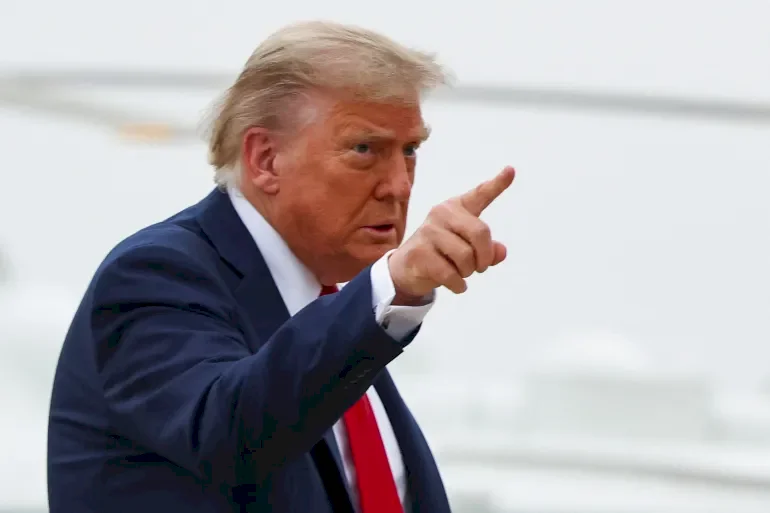
Brussels Shows Willingness to Accept Trump's Tariffs and Calls for Reductions on Specific Sectors
SadaNews - The European Union has expressed its readiness to accept a trade agreement with the United States that includes a comprehensive 10% tariff on many of the bloc's exports, but it wants a commitment from the U.S. to reduce tariffs on key sectors such as pharmaceuticals, alcoholic beverages, semiconductors, and commercial aircraft.
The EU is also pushing to impose quotas and exemptions aimed at effectively reducing U.S. tariffs of 25% on cars and parts, and 50% on steel and aluminum, according to individuals familiar with the matter.
The European Commission, which handles trade matters for the bloc, believes this arrangement slightly favors the U.S. but remains within a range that the EU can accept, according to people who requested anonymity.
A Race Against Time to Avoid Escalating Tariffs
The EU has until July 9 to finalize a trade agreement with Donald Trump before tariffs on nearly all of the bloc's exports to the U.S. rise to 50%.
The U.S. president has imposed tariffs on most of the country's trade partners, stating he seeks to bring back domestic industries, fund the extension of tax cuts, and prevent other countries from exploiting the U.S.
There was no response from a spokesperson for the European Commission to a request for comment.
According to an earlier report from Bloomberg, both the EU and the U.S. are becoming increasingly confident that a preliminary agreement could be reached by July 9, allowing negotiations to continue beyond the deadline.
Any potential agreement is expected to cover both tariff and non-tariff barriers, the purchase of key American goods, and will include additional areas for cooperation, according to the sources.
EU Trade Commissioner Maroš Šefčovič is set to lead a delegation to Washington this week in an effort to advance the talks, according to the sources.
The bloc still views a preliminary agreement as the best possible scenario, but officials have been unable to determine how long the temporary arrangements agreed upon during the negotiation period might last.
Current and Future Tariffs in Brussels' Calculations
Two of the sources indicated that the Commission also wants to ensure that current sectoral tariffs imposed by the U.S., such as those on cars and metals, as well as any future tariffs planned by Washington, are addressed in the agreement from the start.
The EU hopes to address non-tariff barriers mainly through its streamlining agenda and has suggested exploring strategic purchases in several areas such as liquefied natural gas and artificial intelligence technology. The bloc is also open to cooperating with the U.S. on shared challenges related to economic security.
The Commission estimates that current U.S. tariffs affect European exports worth 380 billion euros ($445 billion), approximately 70% of the EU's total exports to the U.S.
The sources said that the Commission informed member states on Monday that it had received an offer from the U.S. that includes tariff barriers, non-tariff barriers, and areas of strategic cooperation. Specific details regarding the U.S. offer, such as potential tariff rates, have not been shared with the member states.
Four Possible Scenarios
Officials outlined four possible scenarios ahead of next week's deadline: an agreement with an acceptable level of imbalance; an unbalanced U.S. offer that cannot be accepted; an extension of the deadline to continue negotiations; or Trump's withdrawal from talks and the imposition of tariffs, according to the sources.
They clarified that the last scenario would likely lead to an EU response using all available options.
In parallel with the negotiations, the bloc continues to prepare retaliatory measures in case the talks yield an unsatisfactory outcome.
Response Options
The EU has agreed to tariffs affecting American goods worth 21 billion euros that can be implemented quickly in response to Trump's metal tariffs.
These measures include politically sensitive products from U.S. states such as soybeans from Louisiana, home to House Speaker Mike Johnson, along with agricultural products, poultry, and motorcycles.
The bloc has also prepared an additional list of tariffs on American goods worth 95 billion euros in response to what is known as the reciprocal Trump tariffs and tariffs on cars.
The list includes industrial goods including Boeing aircraft, U.S.-made cars, and bourbon.
The EU is also consulting with member states to identify strategic areas where the U.S. depends on the bloc, along with potential measures beyond tariffs, such as export controls and restrictions on government contracts.
The EU, seeking a mutually beneficial agreement, remains ready to assess any final outcome, and only then will it decide the level of imbalance it can accept, as previously reported by Bloomberg.

The Problem of Shekel Overcrowding Worsens.. Fuel Station Owners Threatened with Closure o...

The Palestinian Economy at a Crossroads: 4 Files Awaiting Resolution

Palestinian Prime Minister Participates in Davos Economic Forum 2026

Wholesale prices of goods in Palestine record a sharp increase of 9.12% during 2025

Currency Exchange Rates Against the Shekel on Tuesday (20 January)

Exclusive: Israel Fights Gaza with One Hand and Takes Its Money with the Other

Pension Fund: Billions in Debt and Lack of Transparency in Investments
